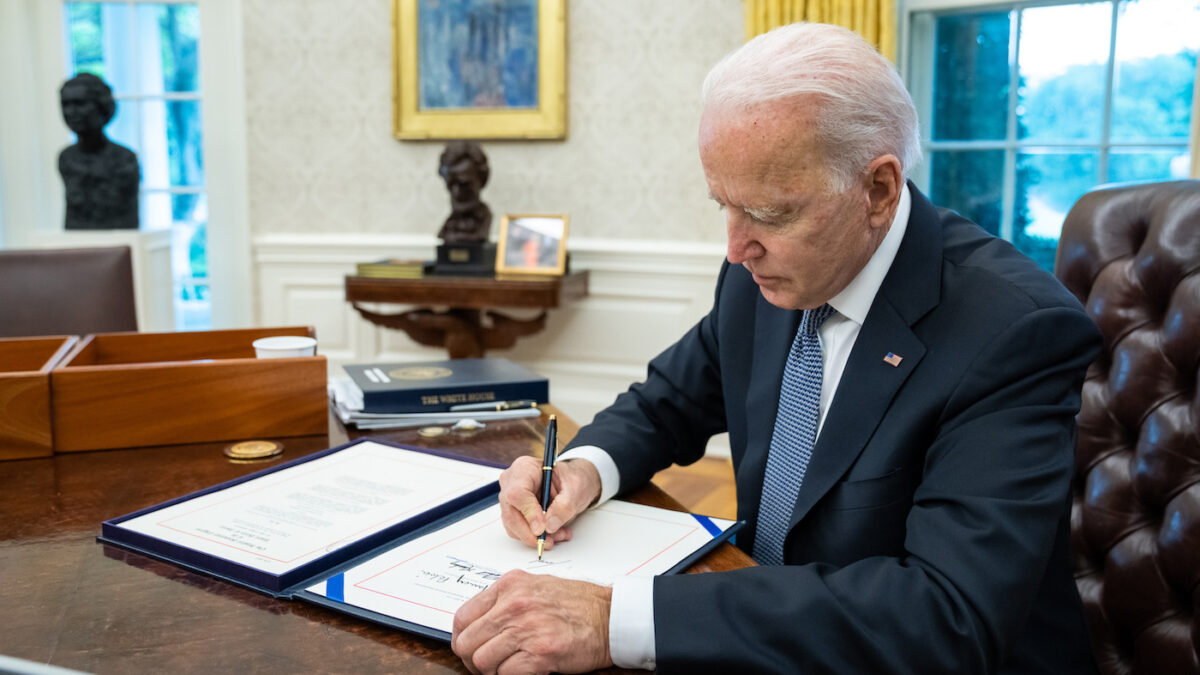Texas Attorney General Ken Paxton asked a federal court on Tuesday to bar the Biden administration from enforcing the Consolidated Appropriations Act of 2023, claiming Congress failed to constitutionally pass the massive spending bill. While the court is unlikely to freeze the entire $1.7 trillion appropriation, Texas presents a strong case for halting two aspects of the bill.
In February, the Texas attorney general sued the Biden administration, arguing the House of Representatives lacked the constitutionally mandated quorum to pass the Consolidated Appropriations Act of 2023. Paxton is now seeking a preliminary injunction to bar the federal government from enforcing the law.
As Paxton details in his brief supporting Texas’ motion, when the House purported to pass the $1.7 trillion spending bill on Dec. 23, 2022, it lacked a quorum because only 201 representatives were present. Yet the House proceeded with the vote, counting votes of both the 201 present lawmakers and adding to the tally an extra 226 votes those lawmakers cast on behalf of absent members who had appointed them as “proxies.”
The House clerk recorded the bill passed — with 225 yea votes, 201 nay, and 1 present — relying on a rule originally adopted in May of 2020 that allowed members to “designate[] another Member as a proxy” to cast their votes if “a public health emergency due to a novel coronavirus is in effect[.]” Biden later signed the Consolidated Appropriations Act on Dec. 29, 2022, purporting to make it law and providing appropriations for the fiscal year ending Sept. 30, 2023.
But the House Proxy Rule violates the quorum clause of the Constitution, Paxton argues in his lawsuit against the Biden administration, and thus the Consolidated Appropriations Act never became law.
As I previously explained, from a constitutional perspective, Paxton’s quorum clause argument is a winner. The quorum clause of the Constitution expressly requires a “majority” of members to constitute a “quorum” to do business. As the Texas complaint details, “the Quorum Clause’s text, the structure of the Constitution, and the longstanding — and until three years ago, unbroken — practice of Congress to conduct its business in-person collectively reinforce that the Constitution forbids proxy voting.”
While Texas’ quorum clause argument appears unassailable, the thought of undoing a $1.7 trillion spending bill is sure to give the court pause. But by going big, Paxton created a strategic quagmire for the Biden administration: Does it argue the merits only and risk the court granting Texas the sweeping remedy Paxton seeks? Or does it suggest the court, if it agrees with Texas’ constitutional claim, limit the remedy to the two aspects of the Consolidated Appropriations Act to which the Lone Star State objects?
In responding to Texas’ motion, the Biden administration will initially claim the quorum clause does not require the physical presence of House members — an unsupportable argument. But the federal government will also likely argue that the “Enrollment Bill Rule” prevents the court from even questioning whether the Consolidated Appropriations Act was constitutionally passed.
Courts have relied on the so-called Enrollment Bill Rule to hold that once a bill is “enrolled” in the official journal of the House (or Senate), challenges to the passage of the bill are precluded. According to Paxton, however, the Enrollment Bill Rule only precludes judicial review of “factual” questions, not “legal” questions. Because Texas’ constitutional challenge presents solely a legal question for the court, Paxton argues the Enrollment Bill Rule does not apply.
Whether the Enrollment Bill Rule prevents judicial review of a quorum clause challenge will be an issue of first impression for the court in Paxton v. DOJ. As such, the court will be especially leery of ruling in a way that cannot be undone. An order barring the enforcement of the Consolidated Appropriations Act is just such a ruling — but so is denying Texas’ motion because once the money is spent, it cannot be recouped.
Given these circumstances — the strength of the quorum clause argument and the questionable reach of the Enrollment Bill Rule — the federal court’s best option will be to grant Texas’ motion, but enter a preliminary injunction limited to the two specific aspects of the Consolidated Appropriations Act challenged by Texas.
Specifically, Texas challenges the Department of Homeland Security’s “Alternatives to Detention Program.” That program releases into the United States illegal aliens, whom Immigration and Customs Enforcement would otherwise detain, based on their promise to appear at future immigration-court proceedings. The DHS program also funds grants, administered by FEMA, to help connect illegal aliens released into the United States with various social services.
The funding of these services encourages illegal immigration, Texas argues, which further burdens the state’s resources. Texas also stresses that the funding program places an emphasis on obtaining “legal counsel” for illegal aliens, which negates the supposed goal of helping prepare program participants to return to their home countries.
In its lawsuit, Texas also objects to the Consolidated Appropriations Act of 2023’s purported expansion of the definition of pregnancy discrimination.
Freezing those two aspects of the Consolidated Appropriations Act of 2023 while Texas’ lawsuit proceeds will maintain the status quo until the courts resolve the important constitutional questions presented in Paxton v. DOJ. Whether the court chooses this prudential option, however, remains to be seen.









